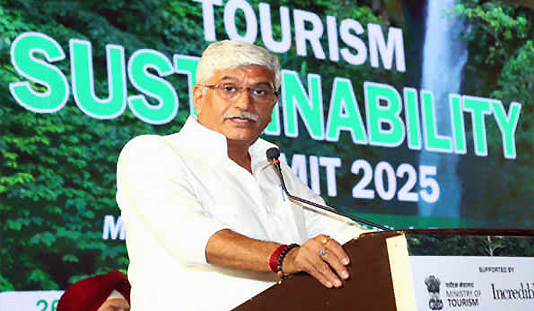
In a landmark address at the Tourism Sustainability Summit 2025, Union Tourism Minister Shri Gajendra Singh Shekhawat unveiled an ambitious roadmap to position India as a global leader in sustainable tourism. Speaking before 500 delegates from 40 nations, the Minister highlighted the urgent need to balance India’s booming tourism sector – projected to grow at 12% annually – with pressing climate challenges. “Last summer’s 43.6°C temperatures in Odisha and the increasing threats to our 30% of climate-vulnerable UNESCO sites are not hypothetical scenarios but our current reality,” Shekhawat emphasized, setting the tone for his transformative agenda.
The Minister announced four groundbreaking initiatives that will reshape India’s tourism landscape: the ₹5,000 crore “Paryatan Par Samriddhi” program to climate-proof 50 key destinations by 2030; mandatory Green Key certification for all 3-star and above hotels within three years; development of carbon-neutral electric vehicle corridors along the Golden Triangle and Buddhist Circuit; and a requirement that 25% of new tourism projects directly support local artisans. Drawing inspiration from existing success stories, Shekhawat cited Kerala’s solar-powered houseboats and Rajasthan’s water-harvesting heritage hotels as models for nationwide replication.
Striking a decisive tone, the Tourism Minister redefined sustainability as essential business strategy rather than corporate social responsibility. “Each heatwave-induced flight cancellation and climate-affected beach resort closure demonstrates that environmental stewardship is now fundamental to operational continuity,” he asserted. Looking ahead to India’s upcoming G20 presidency, Shekhawat pledged to champion a Global Tourism Sustainability Protocol rooted in India’s traditional values of Dharma and Seva.
The visionary address sparked immediate action, with industry leaders forming a Sustainable Tourism Alliance and major hotel chains committing to net-zero operations by 2035. As India’s tourism sector prepares to contribute $250 billion to GDP by 2030, Shekhawat’s comprehensive plan provides a blueprint for making India the first billion-plus population nation to achieve sustainable tourism at scale – offering valuable lessons for hoteliers preparing for stricter environmental norms, tour operators designing green itineraries, investors funding eco-projects, and travelers making conscious tourism choices. With working groups now operationalizing these commitments, India stands poised to demonstrate how economic growth and ecological preservation can advance hand-in-hand, creating a new paradigm for 21st century tourism.

